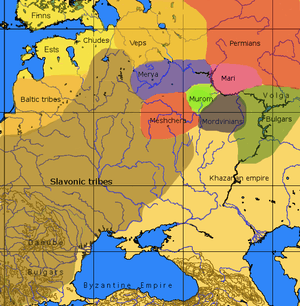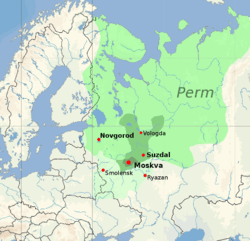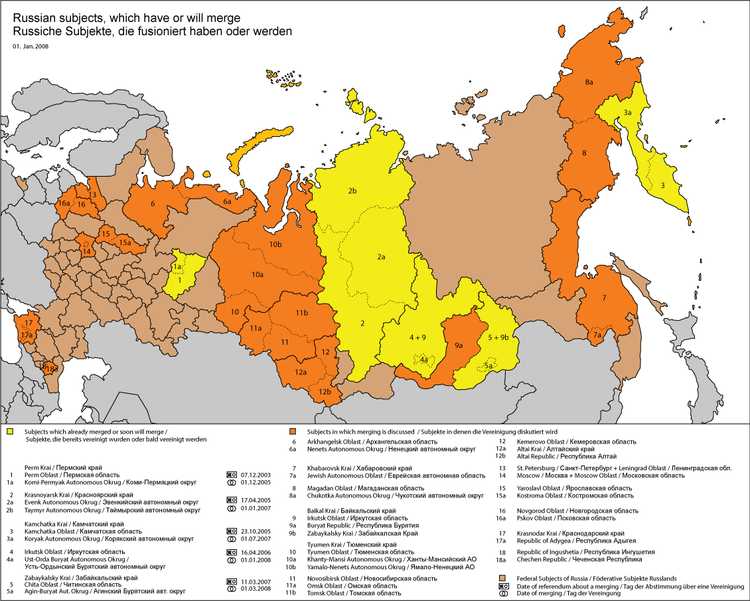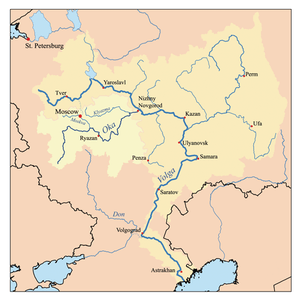Territorial changes of Russia


.jpg)
Territorial changes of Russia in the course of over five centuries happened by means of military conquest and by ideological and political unions.
Ivan III (reigned 1462-1505) and IV (reigned 1547-1584) expanded Muscovy's (1283–1547) borders considerably by annexing the Novgorod Republic (1478). After a period of political instability the Romanovs came to power (1613) and the expansion-colonization process of the Tsardom continued.
While western Europe colonized the new world, the Tsardom of Russia expanded overland - principally to the east, north and south.
This continued for centuries; by the end of the 19th century, the Russian Empire reached from the Black Sea to the Pacific Ocean, and for some time included colonies in the Americas (1732-1867) and a short-lived unofficial colony in Africa (1889) in present-day Djibouti.
The Russian colonial empire, governed from St. Petersburg/Moscow, continued to grow under Soviet rule. Areas that were formerly part of the Russian Empire, and some others that the Red Army captured from the Nazis in 1944-1945 during World War II became part of the autonomous republics within the USSR.
Tsarist era
Before the year 1500 most of the land that is now part of Russia was occupied by non-Russian indigenous people. Many non-Slavic peoples founded own state before Kievan Rus, for example, Sarir state of the Caucasian Avars (5th – 12th centuries), Tsahur Khanate (7th – 16th centuries), Zirikhgeran state of the Dargin and Kubachi peoples (6th – 15th centuries), Gazikumukh Shamkhalate of the Lak people (734–1642), Kaitag state of the Dargin people (6th century – 1813) etc. Russians consider that Russia is not colonial power[1][2] and many nations (except Volga, Astrakhan and Siberian Tatars, and some Caucasian peoples etc.) peacefully joined Russia. Andrei Sakharov, director of the Institute of Russian History of the Russian Academy of Sciences said "Differing views should not be confused with falsification of history".[3] But indigenous peoples deny this view.[4][5][6][7]
Soviet era
The USSR annexed Karelia from Finland, Kaliningrad from Germany, the Kuril Islands and southern Sakhalin from Japan, Tuva (previously governed by Mongolia and Manchu Empire) etc.
Territories of the former Russian Empire that permanently or temporarily became independent:
- Crimean People's Republic, 1917–1918
- Republic of Aras, 1918–1919
- Alash Autonomy, 1917–1920
- Kingdom of Lithuania (1918), 1918
- Ukrainian People's Republic, Ukrainian State , 1917-1921
- Duchy of Courland and Semigallia (1918), 1918
- First Republic of Armenia, 1918–1920
- Azerbaijan Democratic Republic, 1918–1920
- Kingdom of Finland (1918), 1918–1919
- Balagad state, 1919–1926
- North Caucasian Emirate, 1919–1920
- Republic of Latvia (1919–1940), 1919–1940
- Republic of Central Lithuania, 1920–1922
- Centrocaspian Dictatorship, 1918
- Democratic Republic of Georgia, 1918–1921
- Idel-Ural State, 1917–1918
- Moldavian Democratic Republic, 1917–1918
- Mountainous Republic of the Northern Caucasus, 1917–1920
- North Ingria, 1919–1920
- Republic of Oirat-Kalmyk, 1920
- Transcaucasian Democratic Federative Republic, 1918
Post Soviet Era
According to poll carried by "Levada Center" in 2013, about 1/4 of respondents supported separation of North Caucasian republics.[8]



In the early 2000s some autonomous districts were merged with larger oblasts or krays. On 20 December 2012 Putin said Tsarist Russia normally developed without autonomous areas.[9][10]
Following the annexation of Crimea, the Ukrainian peninsula became part of the Russian Federation.
Separatist states:
- Chechen Republic of Ichkeria, 1991–2000
See also
Notes and references
- ↑ Освоение новых земель сибири, переселенцы
- ↑ Proof that Russians are Natives of Siberia and North Asia
- ↑ Andrei Sakharov, "Differing views should not be confused with falsification of history"
- ↑ Kalpana Sahn "Crucifying the Orient – Russian Orientalism and the Colonization of Caucasus and Central Asia", 1997
- ↑ 150 Years Ago, Sochi Was the Site of a Horrific Ethnic Cleansing
- ↑ Anna M. Kerttula "Antler on the Sea: The Yup'ik and Chukchi of the Russian Far East" 2000
- ↑ Jan-Pieter Verheul "Chukchi"
- ↑ Большинство россиян согласились отделить Чечню от России
- ↑ Пресс-конференция Президента России Владимира Путина (полная версия)
- ↑ Путин ответил на вопросы
- Iavorsky, M. Ukraina v epokhu kapitalizmu Kiev: Derzhavne Vydavnytstvo Ukrainy, 1924.
- Koropeckyi, I. Development in the Shadow (New York, 1990)
- idem, ed. Ukrainian Economic History(Cambridge MA, 1991)
- Krawchenko,B. Social Change and National Consciousness in Twentieth Century Ukraine (NewYork, 1985)
- Martin, Virginia. Law and custom in the steppe: the Kazakhs of the Middle Horde and Russian colonialism in the nineteenth century. Richmond: Curzon, 2001
- Serbyn, Roman. Lenine etla question ukrainienne en 1914. Pluriel no. 25, 1981.
- Subtelny, Orest (1988). Ukraine: A History. Toronto: University of Toronto Press. ISBN 978-0-8020-5808-9.
- Velychenko, Stephen, The Issue of Russian Colonialism in Ukrainian Thought.Dependency Identity and Development, AB IMPERIO 1 (2002) 323-66
- Forsyth, James. "A History of the Peoples of Siberia: Russia's North Asian Colony 1581-1990" (1994)
